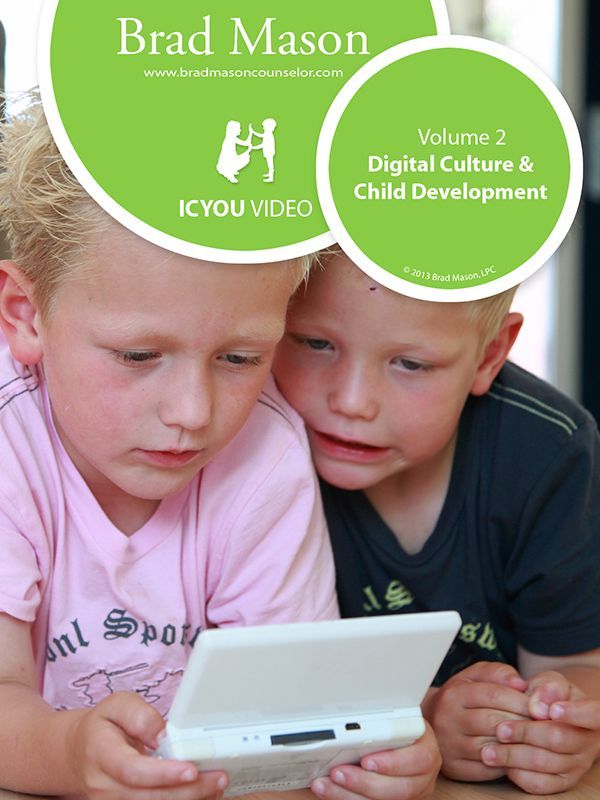Digital Diet for Children and Teens

In this article about Digital Diet for Children and Teens you will find:
-A discussion exploring the impact of common themes in digital media on our social and emotional development.
-Proposed methods for healthy technology management
-A template for a family media agreement establishing safe boundaries and consequences should they not be followed
-Pros and cons of digital media
-Resources for parents to use for managing children’s technology use
-Resources and discussion of video game addiction issues
-A list of non-violent, cooperative, and educational video games and shows/movies
-Tools for keeping kids safe online
Many of us think about how much time we or our children spend consuming digital media, are we as vigilant in considering a balanced diet when it comes to digital content? Maybe we set time limits, like no more than two hours of video games on weekdays, but what sort of ideas are we pumping into our minds?
For example, how much of what we watch and participate in contains acts of violence as a method to resolve conflicts? Consider popular superhero stories. You don’t see Batman saying, “Okay, I’m getting really mad at you villains’ criminal abusive acts. I don’t want to get violent, so I’m going back to my batcave to play with my tech toys until I calm down. Then we can sit down and work this out by talking like civilized people.”
Vengeance. You did that to me, now I will do this to you. Is this justice, or is this idea of justice what wars are based on? A sense of justice that says, it’s not right to hurt people, so since you did this to us, we are going to hurt you back with this… attack?
If the good guy wins, using the same methods against the villain that justified the attack response, does the idea of a good guy and bad guy just depend on which side you are on, while objectively both parties are using the same methods which they would say are wrong?
How many of our popular shows or video games model legal and ethical ways to treat other people and negotiate conflicts? Or do they demonstrate what we say we think is wrong and would land us in jail? Anger, fear, beatings, and murder, these are the same with or without “justification,” would we want to teach to justify these conditions, really?
If we are bothered by anxiety or depression, is watching apocolyptic…world-ending threats, barely-won battles fought at the extreme of endurance and vigilance… what is contained in the digital diet for children and teens that is forming their attitudes, beliefs, thoughts, and identity?
What if we continually expose ourselves to human scenarios relying on big conflicts for drama, tension, and interest? Would real life seem boring, could we be training our brains to anticipate tense frightening and even threatening human interaction scenarios? Would we be fostering social anxiety and teaching the world is a scary place, you have to be really careful or you might not be okay, people are not to be trusted and out to get you?
Unless you are trying to program soldiers who will be living in the world we say we want to be peaceful, fair, devoid of abuse and violence.

If we are feeling unimportant, unremarkable, unmotivated, unliked, is exposing ourselves to worlds of magic and super powers and mega-weapons going to help us appreciate our regular mortal selves? Can all children slip easily between a fantasy super-avatar in a fantasy world back to a regular self with normal human powers and limits? Or as the discrepancy between the fantasy self and real self widens, the video game avatar and indulgence supersedes homework and chore routines, grades drop, real social contact formation and maintenance is neglected, parents and teachers beseech and criticize, would some children become disappointed with their real self, avoiding criticism and disappointing reality by further burying themselves in their made-up world facilitated by the virtual reality of video games and virtual friends?
Below are templates I made for you to address and get specific about how technology and media will and will not be used at your house:
The following document summarizes some pros and cons of digital media based on research with a list of resources for further investigation:
If you are interested in exploring more information and studies about how digital media impacts attention, memory, thought, meta-awareness, and attitude, try googling “Six ways digital media impacts the brain.”
Below is a fairly comprehensive guide for caregivers to use with kids, teens, and college students, or for them to use for themselves, to regain engagement and motivation for self-care, academic involvement, and socialization:
Below is a link to an article I wrote for those considering if there may be an issue with video game addiction:
I encounter many youth who are unable to resist the temptation to click into the rabbit hole of YouTube links or video games when they should be doing schoolwork or sleeping. I read a great biography about Steve Jobs, called Steve Jobs. In it he was quote as saying, while developing the ipad, with kids in middle school, that he would never give these devices to his kids to use unsupervised, because there was no way they could resist these temptations. He knew.
Here are a few non-violent, cooperative, and educational video games and shows/movies to help balance a digital diet for children and teens:
- Tools Up video game
- Moving Out video game
- Out of Space video game
- Twin Sprouts video game
- Pode video game
- Space Food Truck video game
- Juggle Panic video game
- Bleep Boop video game
- Shift Happens video game
- Superflight video game
- Cities: Skylines video game
- Abzu video game
- Floating Point video game
- Pix the Cat video game
- Captain Toad, Treasure Tracker video game
- If you google this topic, you can find many more!
- Below are just a few shows and movies with non-violent conflict resolution:
- Planes, Trains, and Automobiles
- Life is Sweet
- All or Nothing
- Secrets and Lies
- The Family Stone
- The Big Chill
- Gilmore Girls
- Aphablocks
- Cochameleon
- Ask the Storybots
- Blues Clues
- Dora
- Arthur
- Danger Mouse
- Again, there ARE many good options out there you can use to try to balance against often more popular programming where even the “good guys” are using violent means to resolve conflicts, and don’t have weapons and death as their schtick to attract and entertain.
Tools for Keeping Kids Safe Online
- Bark- can go on a phone and notifies you if certain risky keywords are detected in searches or texts, etc, such as sex or self-harm references
- Qustodio
- Kaspersky
- Net Nanny
- Ourpact
- Mobicip
- OpenDNS VIP home
- Websafety
- Cleanrouter
- Circle
I know kids are smart and can often circumvent any software you install for safety. In addition some school districts are handing out chromebooks or other devices, they are using YouTube as part of their instruction, and they won’t allow you to install your own filters. You can use a router-level filter at least at home. You can also put a cheap lamp timer on your router and set it to turn off at 10pm or whenever and come back on at a designated time in the morning. This means you can’t stay up and use it either.
Remember, garbage in, garbage out. We’ve all heard “You are what you eat.” To what extent do you imagine “You become what you see and hear.”
I hope you enjoyed this article, Digital Diet for Children and Teens, and that you might use the information to improve the welfare of yourself and your family.
Brad Mason
I want to create healthy happy life
It can be hard to work with a mind that keeps going to the problems and worries. It's time to teach children their power over thoughts and feelings.
I would like teachable exercises for; replacing thoughts that are not helpful, reasonable, or true, creating joy and emotional resilience, Mindgarden metaphor illustrating power and choice in thoughts, Dream Book strategy for identifying clear goals and building motivation, a video explaining how NOT to let others or situations have the power to bring you down!